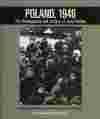Poland 1946: Photographs of John Vachon

Aukcja w czasie sprawdzania nie była zakończona.
Cena kup teraz: 79 zł
Użytkownik www_bookoff_pl
numer aukcji: 2114439520
Miejscowość Warszawa
Wyświetleń: 8
Koniec: 12-03-2012, 14:26
